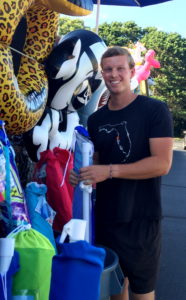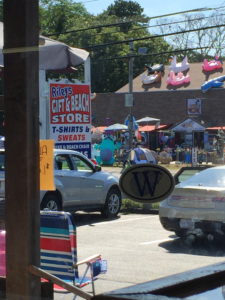WELLFLEET — Along the pine-fringed stretch of Route 6 in South Wellfleet, farm stands have come and gone, motels have changed hands, and a clam shack has turned into a patisserie. But there is one roadside scene that hasn’t changed much over the years — give or take a few giant inflatable dinosaurs.

Two souvenir and beach supply shops, located on opposite sides of the highway, face each other across a sea of whirligigs, umbrellas, and blow-up toys. The Seaberry Surf gift shop, on the west side of Route 6, was founded more than half a century ago by Richard and Janet Byrne and remains a family operation, run by their daughter and son-in-law. Riley’s Gift and Beach Store, across the highway on the east, was founded in 1982 by Frederick Riley and his sons Michael and Steven. It, too, has stayed in the family, with Steven, now a part-time Eastham resident and grandfather of seven, overseeing the day-to-day operation of the shop.
Collectively, the two stores have been doing business on the Outer Cape for 97 years.
That’s a lot of suntan oil.
For the Rileys, it started with T-shirts. In 1980 the Enfield, Conn.-based family began selling them for $2 each from a van parked at the Wellfleet Flea Market. Two years later they moved to a 500-square-foot patch of grass at the side of Route 6 and sold the shirts out of four wooden bins. It wasn’t until 1992 that they got a brick-and-mortar storefront, opening “Riley’s $2 T-Shirt Outlet” about a half mile down the highway, at 464 Route 6, opposite Seaberry Surf.
Today Steven Riley owns and manages the store with the help of a small clutch of J-1 visa workers and dedicated locals, including 30-year employee Nancy Sateriale. His inventory has expanded to include locally made jams, saltwater taffy, sunglasses, keychains, Frisbees, beach tents, boogie boards, hermit crab kits, and much more.
“We try to sell whatever it is you forgot,” Riley says. “A girl stopped in the other day — she was in her 20s, on a last-minute trip to the Cape. She didn’t have a bathing suit or sunglasses or suntan lotion.” When she left the shop, he says, “She was heading to the water for $7.”

Seaberry controversies
On the other side of the highway, Seaberry Surf has catered to vacationers for almost as long as the highway has existed. In 1959 the Byrnes, entrepreneurs who also started the Cape Tradewinds candy and souvenir store on Canal Road in Orleans, bought an ice cream stand at 461 Route 6 and turned it into a souvenir shop, selling oil paintings, baskets, and other trinkets.
Plans to add a package store to the site were quashed in 1967 when the Byrnes’ bid for a variance was turned down by the Wellfleet Zoning Board of Appeals. The ZBA said the change would not only be “objectionable to the neighborhood,” according to the Cape Codder, but would increase the property’s nonconformity. (The business had been grandfathered in when the area was zoned residential in 1966.)
In 1984, the Byrnes’ son-in-law, Jim Baptist, and their daughter Lori took over the management of the shop, keeping it open from April to October and heading to Florida for the winter. They’ve since added their son, Corey, and a crew of student workers from other countries to their staff.
Seaberry Surf marks its 60th anniversary this year — a South Wellfleet institution, despite occasional headlines about its outdoor displays of surfboards and beach bric-a-brac pushing the bounds of propriety.
Mike Rice, a homeowner who lives around the corner from both Riley’s and the Byrnes’ establishments and who’s been looking at those displays for 40 years — not always happily — concedes that the shops are, in a way, almost iconic.
“It’s a throwback to old Cape Cod,” says Rice. “They’ve been there so long — before, you know, the sharks and the pot shops and the short-term rental tax.”
Mild-mannered proprietor
To the reporter who wanders into Riley’s Gift and Beach Shop one midsummer Sunday afternoon, the owner doesn’t hesitate to offer a seat — there are about 25 different styles of folding beach chair to choose from on the back deck. Riley is equally gracious with his time, talking about trends in beach recreation over the years, his nephew’s forays into the bike rental business in Provincetown, grandchildren, and sharks.

“We have sharks on our T-shirts and sweaters. We sell little shark figures. We have a shark that’s hanging out front,” Riley says, nodding toward the parking lot, where a six-foot rubber shark is strung from a post — a popular photo op for tourists. But Riley thinks the arrival of real white sharks in Cape waters has hurt sales overall.
“We used to sell a lot of boogie boards and floatie toys for the water,” says Riley. Not so much in the last few years. “With the death of that young man off Newcomb Hollow — it’s tough, you know?” says Riley, referring to the September 2018 shark attack that killed a young boogie boarder at the Wellfleet beach.
Another change affecting business may be the advent of electronic devices like iPads might also be changing families’ vacation routines — keeping children occupied indoors, not out.
You have to wonder, he says, “With all these electronics coming on, are the kids still going to want to play on the beach?”
Floatie stories
Across the way, at Seaberry Surf, an outdoor zoo of gigantic inflatable toys, including a unicorn the size of a Ford F-250, refuses to impugn the Cape vacationer’s zeal for water sports. A five-foot blow-up shark’s head is strapped to the roof, alongside a pod of blow-up dolphins. Leopard-print rafts hang on the front of the building.
The showy storefront has been part of Baptist’s sales strategy since a slow week in the mid-1980s, when, according to shop lore, he blew up a pool float and propped it outside, hoping to lure tourists on their way to Provincetown.
It worked. The floaties multiplied, serving not only as a diversion for passing motorists but, eventually, a reluctant waymark for local residents. Rice, who lives on Fresh Brook Lane, used to tell anyone asking for directions to his house to take “the next left after they see the green inflatable alligator tied to the phone pole” on Route 6.
Once, Rice says, there were so many inflatable dinosaurs outside the shop that when a bunch of them broke loose during the No-Name Storm of 1991, a friend of Rice’s driving down Route 6 “thought he was in Jurassic Park.”
Has Baptist noticed a drop in floatie sales since the shark furor hit?
“Oh, God, no — we’d be out of business,” he says from behind the candy counter, arms folded across his chest, tan face shaded by a ball cap with a fish hook stuck to the brim.
Baptist describes the white shark issue on the Cape as “oversensationalized.”
“It is a real threat, but not what they’re making it out to be,” he says, adding that he’s “not even fazed by it. We’re probably selling more now than we ever have.”
East vs. west?
Though some have speculated that a longstanding feud fuels tensions between the two shops — Baptist still smarts from a newspaper story published a few years ago that played up the Hatfields vs. McCoys angle — both proprietors dismiss such notions.
“We don’t really get in each other’s way. We say hi to each other in the spring, and we say goodbye in the fall,” says Riley, chalking the silence between them up to plain old-fashioned competition. “We don’t have a need to talk. If we did, it would be about pricing, and that wouldn’t be good for our customers. The fact that we don’t hang out and go to dinner every week is good for the consumer.”
Baptist agrees, saying the two might get in touch when the post office mixes up their packages — but that’s about it.
In the end, says Baptist, “It’s just two stores going about our business here and trying to make it work.”
